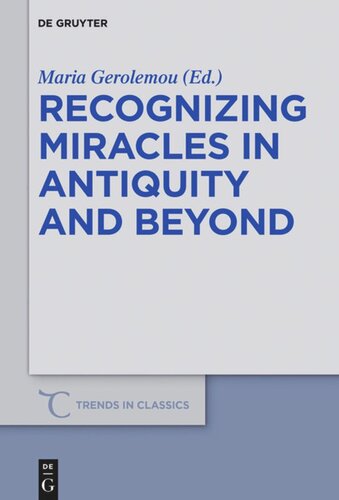

Most ebook files are in PDF format, so you can easily read them using various software such as Foxit Reader or directly on the Google Chrome browser.
Some ebook files are released by publishers in other formats such as .awz, .mobi, .epub, .fb2, etc. You may need to install specific software to read these formats on mobile/PC, such as Calibre.
Please read the tutorial at this link: https://ebookbell.com/faq
We offer FREE conversion to the popular formats you request; however, this may take some time. Therefore, right after payment, please email us, and we will try to provide the service as quickly as possible.
For some exceptional file formats or broken links (if any), please refrain from opening any disputes. Instead, email us first, and we will try to assist within a maximum of 6 hours.
EbookBell Team

4.3
38 reviewsIn recent years, scholars have extensively explored the function of the miraculous and wondrous in ancient narratives, mostly pondering on how ancient authors view wondrous accounts, i.e. the treatment of the descriptions of wondrous occurrences as true events or their use. More precisely, these narratives investigate whether the wondrous pursues a display of erudition or merely provides stylistic variety; sometimes, such narratives even represent the wish of the author to grant a “rational explanation” to extraordinary actions. At present, however, two aspects of the topic have not been fully examined: a) the ability of the wondrous/miraculous to set cognitive mechanisms in motion and b) the power of the wondrous/miraculous to contribute to the construction of an authorial identity (that of kings, gods, or narrators). To this extent, the volume approaches miracles and wonders as counter intuitive phenomena, beyond cognitive grasp, which challenge the authenticity of human experience and knowledge and push forward the frontiers of intellectual and aesthetic experience. Some of the articles of the volume examine miracles on the basis of bewilderment that could lead to new factual knowledge; the supernatural is here registered as something natural (although strange); the rest of the articles treat miracles as an endpoint, where human knowledge stops and the unknown divine begins (here the supernatural is confirmed). Thence, questions like whether the experience of a miracle or wonder as a counter intuitive phenomenon could be part of long-term memory, i.e. if miracles could be transformed into solid knowledge and what mental functions are encompassed in this process, are central in the discussion.